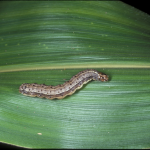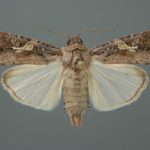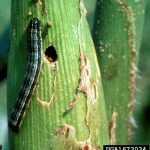Fall armyworm is a new exotic pest recently detected in North Queensland. While bananas are not a preferred host, this pest has serious implications for other agricultural industries including sugar cane and horticulture in North Queensland.
What is Fall armyworm?
Fall armyworm (Spodoptera frugiperda) is an invasive moth pest. It has been found at South Johnstone, Tolga, Lakeland and Bowen, after detections on two Torres Strait islands, at Bamaga and Georgetown in February.
Fall armyworm is known to feed on more than 350 plant species including maize, cotton, rice, sorghum, sugarcane, wheat and many vegetable and fruit crops. While it will eat banana plants, they are not a preferred host.
Fall armyworm poses a threat to Queensland’s agricultural industries.
What are the symptoms
- Signs of the pest include egg masses, plant leaf damage or fruit or vegetable damage
- Larvae initially feed on leaves, creating pinholes and windows in leaf tissue, and giving leaf margins a tattered appearance. Larvae can also eat buds and tunnel into and feed on fruit
- In grass-like plants, they often feed within the leaf whorl (where leaves radiate from or wrap around the stem or stalk)
- Can defoliate preferred host plants and acquire an ‘army worm‘ habit and disperse in large numbers
How does it spread?
The adult moths are capable of flying long distances. In the Americas, adult moths can undertake annual seasonal migration as far north as Canada. Fall armyworm can also spread through people movement.
Where in the world is it found?
Fall armyworm is native to tropical and subtropical regions of the Americas. Since 2016 it has rapidly spread to and throughout Africa, the Indian subcontinent, China and Southeast Asia. The recent detection in Far North Queensland is the first time it has been discovered in Queensland.
What are we doing to protect the industry?
- Strict regulation concerning import of plant and plant products
- Surveillance
- Increase awareness among industry stakeholders; and
- Growers are urged to monitor crops for signs of unusual levels of caterpillar damage leading to defoliation of the crop
What can I do to protect my farm?
While the potential impact of fall armyworm is considered to be low for the banana industry, another pest incursion reinforces the need for growers to have solid on-farm biosecurity. This includes:
- Using clean plant material
- Limit vehicle and machinery movement on farm
- Implement boot decontamination system
- Vigilance in regular crop monitoring, and
- Photograph and report any suspect sightings to the Department of Agriculture and Fisheries (DAF) on 13 25 23
For more information on the Fall armyworm visit DAF at www.daf.qld.gov.au



